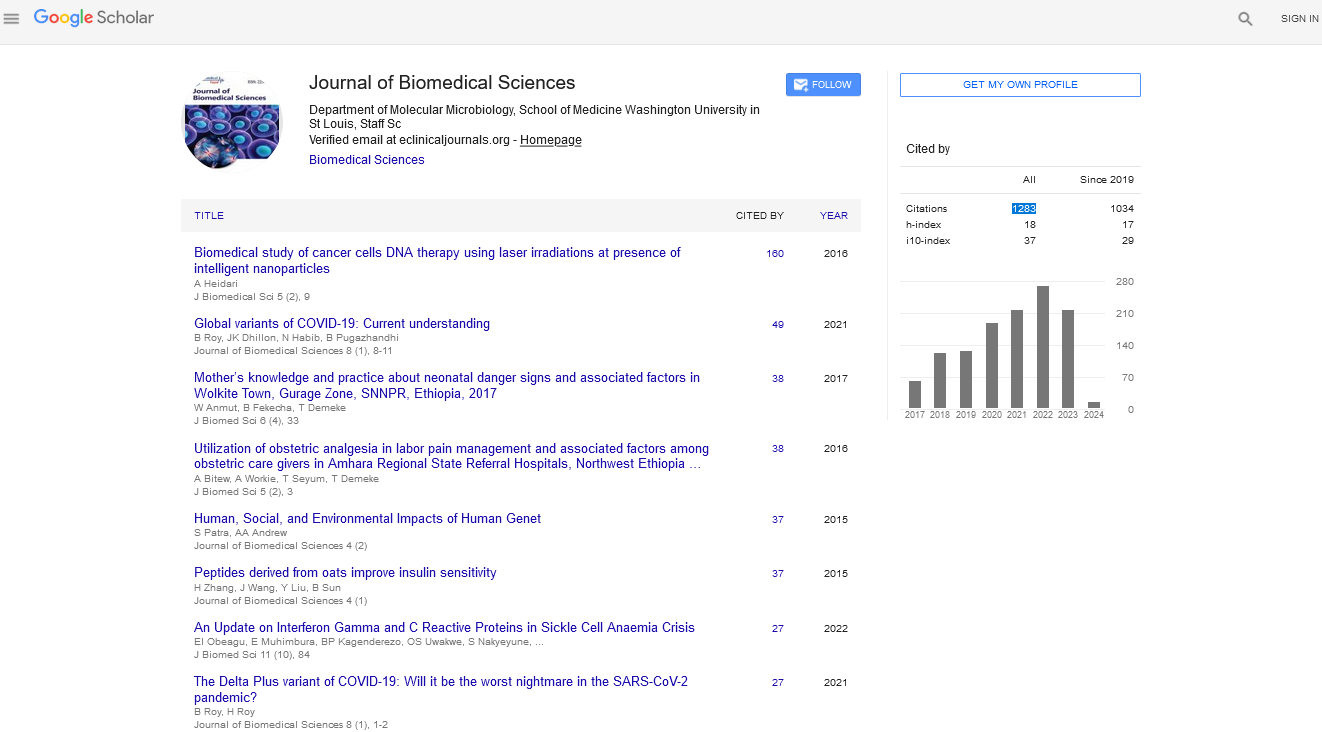Commentary - (2024) Volume 13, Issue 5
Impact of Epigenetics on Disease Development
Rui Vilarinho*
Department of Neuroscience and Biomedical Sciences, University of Porto, Porto, Portugal
*Correspondence:
Rui Vilarinho, Department of Neuroscience and Biomedical Sciences, University of Porto, Porto,
Portugal,
Email:
Received: 17-Sep-2024, Manuscript No. IPJBS-24-15327;
Editor assigned: 20-Sep-2024, Pre QC No. IPJBS-24-15327 (PQ);
Reviewed: 04-Oct-2024, QC No. IPJBS-24-15327;
Revised: 14-Oct-2024, Manuscript No. IPJBS-24-15327 (R);
Published:
21-Oct-2024
Description
Epigenetics is an emerging field of biology that studies
heritable changes in gene expression that do not involve
alterations to the underlying DNA sequence. These changes can
influence an individual's phenotype without modifying their
genotype, highlighting the complex interplay between genetics
and the environment in disease development. Understanding
epigenetics has profound implications for numerous fields,
particularly in understanding the onset and progression of
diseases, including cancer, cardiovascular disorders, and
neurodegenerative conditions. This article explores the
fundamental concepts of epigenetics, its mechanisms, and its
impact on various diseases.
Understanding epigenetics
Epigenetics encompasses various molecular mechanisms that
regulate gene expression, influencing how genes are turned on
or off. The primary epigenetic modifications include DNA
methylation, histone modification, and non-coding RNA
involvement.
DNA methylation: DNA methylation involves the addition of a
methyl group to the cytosine residues in the DNA sequence,
typically in a CpG dinucleotide context. This modification often
represses gene expression by preventing transcription factors
from accessing the DNA. Aberrant DNA methylation patterns are
associated with various diseases, particularly cancer, where
hypermethylation of tumor suppressor genes can lead to
uncontrolled cell growth.
Histone modification: Histones are proteins that package DNA
into chromatin, and their post-translational modifications such
as acetylation, methylation, phosphorylation, and ubiquitination
play a crucial role in regulating gene expression. These
modifications can either promote or inhibit transcription,
influencing cellular responses and identity. Dysregulation of
histone modifications has been linked to various diseases,
highlighting their importance in maintaining normal cellular
function.
Non-coding RNAs: Non-coding RNAs (ncRNAs) are a diverse
class of RNA molecules that do not translate into proteins but
are crucial in regulating gene expression. MicroRNAs (miRNAs)
and long non-coding RNAs (lncRNAs) can modulate gene expression at various levels, including transcription and
translation. Abnormal expression of specific ncRNAs has been
associated with the development of various diseases, illustrating
their potential as biomarkers and therapeutic targets.
Epigenetics and cancer development
Cancer is one of the most well-studied areas in epigenetics
research, as epigenetic changes can profoundly influence
tumorigenesis. Alterations in DNA methylation and histone
modification patterns can lead to the activation of oncogenes
and the silencing of tumor suppressor genes, facilitating
uncontrolled cell growth and proliferation.
Hypermethylation and tumor suppressor genes: In many
cancers, the promoter regions of tumor suppressor genes are
hypermethylated, leading to gene silencing. For example, the
p16INK4a gene, a critical regulator of the cell cycle, is frequently
silenced in various cancers due to promoter methylation. Loss of
p16INK4a expression allows cells to bypass normal growth
control mechanisms, contributing to cancer progression.
Hypomethylation and oncogene activation: Conversely,
hypomethylation can lead to the activation of oncogenes. For
instance, the overexpression of genes like c-Myc, which plays a
crucial role in cell proliferation, has been linked to
hypomethylation events. These epigenetic alterations create an
environment conducive to cancer development and progression.
Epigenetic therapeutics: The understanding of epigenetic
modifications has led to the development of novel therapeutic
strategies, including the use of demethylating agents and
histone deacetylase inhibitors. Drugs like azacitidine and
vorinostat aim to reverse aberrant epigenetic changes, restoring
normal gene expression patterns in cancer cells and enhancing
the efficacy of existing therapies.
Epigenetics and cardiovascular diseases
Cardiovascular Diseases (CVDs) are the leading cause of
mortality globally, and emerging evidence suggests that
epigenetic modifications significantly contribute to their
development. Factors such as diet, exercise, and environmental
toxins can induce epigenetic changes that influence
cardiovascular health.
Role of DNA methylation in atherosclerosis: Atherosclerosis,
a condition characterized by the buildup of plaques in the
arterial walls, has been linked to altered DNA methylation
patterns. Methylation changes can affect the expression of
genes involved in lipid metabolism, inflammation, and
endothelial function, all of which are critical in atherosclerosis
development. Studies have identified specific genes, such as
those involved in cholesterol transport, that exhibit differential
methylation in individuals with atherosclerosis compared to
healthy controls.
Histone modifications and cardiac hypertrophy: Cardiac
hypertrophy, an adaptive response to stress that can lead to
heart failure, is also influenced by histone modifications.
Changes in histone acetylation and methylation patterns can
affect the expression of genes involved in cardiac muscle function and growth. For example, increased histone acetylation
of specific genes has been associated with pathological
hypertrophy, emphasizing the role of epigenetics in cardiac
remodeling.
Epigenetics has revolutionized our understanding of disease
development by highlighting the complex interplay between
genetic and environmental factors. Aberrant epigenetic
modifications play a crucial role in various diseases, including
cancer, cardiovascular disorders, and neurodegenerative
conditions. By understanding the mechanisms underlying these
changes, researchers can develop innovative therapeutic
strategies and personalized medicine approaches to combat
disease. As the field of epigenetics continues to evolve, its
implications for health and disease will likely expand, offering
new insights and opportunities for intervention.
Citation: Vilarinho R (2024) Impact of Epigenetics on Disease Development. J Biomed Sci Vol:13 No:5





